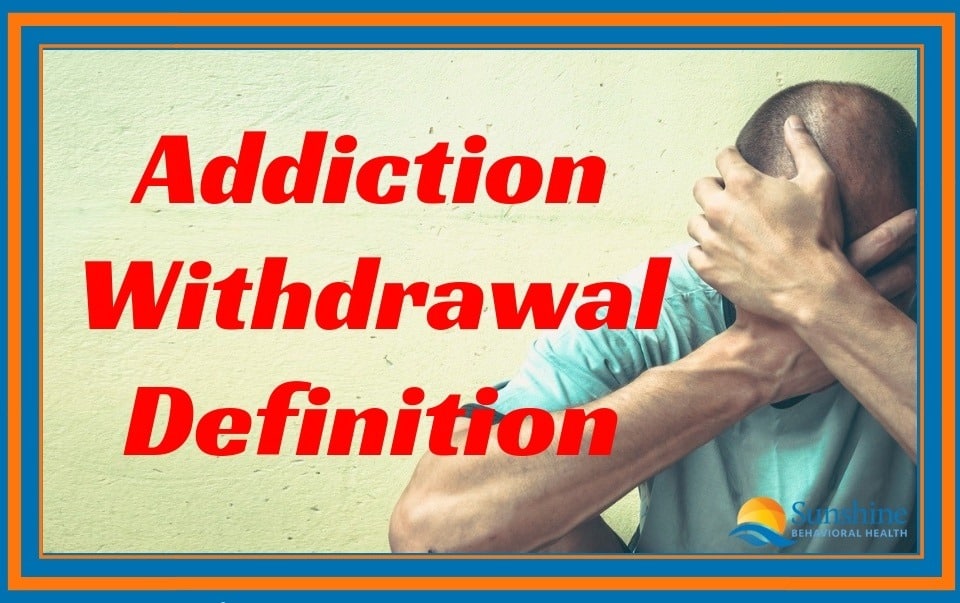
Addiction Withdrawal Definition
Addiction was often associated with substances like alcohol and drugs. However, this has been changed especially in the part of the American Society of Addiction Medicine (ASAM). Addiction is now defined as a chronic brain disorder brought about by the motivation, memory, and reward associated with substances or behavior regardless of its negative consequences.
Addiction is both a psychological and physical dependence wherein the production of neurotransmitters is suppressed because of these brain depressants. Addiction withdrawal definition can then be viewed as a process of taking off the weight that suppresses the production of neurotransmitters like noradrenaline. It instead causes the production of adrenaline causing the withdrawal symptoms.
Addiction Withdrawal Definition: What Addicted Individuals Go Through once they Stop Entertaining their Addictions
Withdrawal definition for addictions is not solely determined by the cause of addiction but also how the substances interact with the body and the brain. The most common addictions are alcohol, drugs, sex, gambling, and eating. The obsessive behavior towards the addictive stimulus causes the individual to put it over and above other important things in life. Once these stimuli are removed, the withdrawal symptoms become evident in two aspects: physical and emotional.
Physical withdrawal is commonly caused by alcohol, tranquilizers, and opiates while emotional withdrawal is often caused by substances like marijuana, cocaine, and ecstasy. Some addicts experience more physical withdrawal than emotional, or vice versa.
Signs and Symptoms of Addiction Withdrawal
Withdrawal definitions for addictions are more evident in the signs and symptoms that the withdrawal can be associated with. It varies per individual but there are usually some common emotional withdrawal symptoms. Addicted persons who stop their behavior or substance addiction commonly experience agitation, irritability, depression, and obsession with the behavior or the substance. Physical symptoms include tremors, nausea, and stomach cramps. Others who are already suffering from a more severe addiction experience blackouts and short-term loss of memory. Uncomfortable is the main term that can define all these withdrawal symptoms.
Alcohol and Drug Withdrawal Symptoms:
Alcohol and drug addiction definition withdrawal symptoms can be categorized as mental and emotional, and physical withdrawal symptoms.
-
Mental and Emotional Withdrawal Symptoms:
These symptoms are experienced by all drug addicts. Some of those who experience these do not experience physical withdrawal. The following should be observed closely so people surrounding the addicted individual can assist them:
-
Depression: It can be observed in the form of lack of enjoyment, social isolation, fatigue, and poor appetite.
-
Anxiety: Restlessness, panic attacks, and irritability show anxiety.
-
Sleep: Addicted persons either have difficulty falling asleep or staying asleep and they complain of insomnia.
-
Cognitive: They exhibit poor memory and concentration.
-
Physical Withdrawal Symptoms:
-
Head: They complain of headaches and dizziness
-
Chest: They experience chest tightness and difficulty in breathing
-
Heart: Undergoes palpitations, racing heart, and skipped beats
-
GI: They experience stomach aches, vomiting, nausea, and diarrhea
-
Muscles: Their muscles twitches, shakes, and tremors. They also experience muscle tension and aches.
-
Skin: Tingling sensation and sweating
Withdrawal Symptoms Caused by Alcohol and Tranquilizers
Withdrawal definition addiction from alcohol and tranquilizers cause the most dangerous of all forms of physical withdrawal. Stopping the use of alcohol and tranquilizers causes seizures, heart attack, and stroke. The best option to minimize these withdrawal symptoms is to seek medical supervision. The following are some of the dangerous withdrawal symptoms:
-
Heart attack
-
Grand mal seizure
-
Stroke
-
Delirium tremens (DTs)
-
Hallucinations
When an opiate-addicted person stops from using it like oxytocin and heroin, they also experience discomfort. Nevertheless, it is not as dangerous as it is not mixed with other substances. Withdrawal from heroin even doesn’t cause seizures, strokes, heart attacks, or delirium tremens.
Withdrawal Stages: Acute and Post-Acute Withdrawal Stages
The withdrawal comes in two stages in the life of an addicted person. First is the acute stage which lasts for a few weeks. The second stage is called the post-acute stage, which is exhibited in the form of the same symptoms to addicted individuals experiencing withdrawal. These are more on emotional and psychological manifestations.
Drug and Alcohol Addiction Withdrawal Treatment
The withdrawal effects of drug and alcohol addiction are uncomfortable and dangerous. It is mainly the reason why addicted persons find it hard to control their addictions. Tolerance withdrawal addiction definition causes them to seek more of the addictive substances than to opt for eliminating the cause of the addiction. The process may be difficult but the cure is possible.
There is hope and it is evident in people who have successfully overcome their addiction. Medical and non-medical centers and detox programs can help eliminate the discomfort. Anti-anxiety and antidepressants can also be used as safe drub substitutes by medical professionals. Addiction treatment options are available for anyone interested in seeking help for their addiction. There are also self-help groups, inpatient addiction rehabs, and outpatient rehab centers where you can go to for addiction treatment. The options are available to seek for help and start your journey in overcoming withdrawal symptoms and your addiction. Do you still have questions? If so, then Sunshine Behavioral Health can help.A Message From Our CEO
Medical disclaimer:
Sunshine Behavioral Health strives to help people who are facing substance abuse, addiction, mental health disorders, or a combination of these conditions. It does this by providing compassionate care and evidence-based content that addresses health, treatment, and recovery.
Licensed medical professionals review material we publish on our site. The material is not a substitute for qualified medical diagnoses, treatment, or advice. It should not be used to replace the suggestions of your personal physician or other health care professionals.




